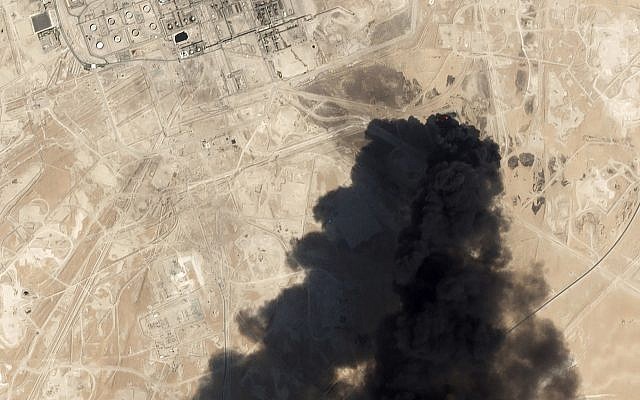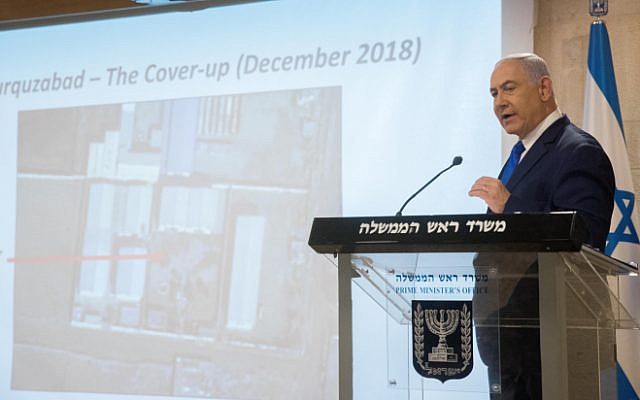IRGC’s deputy head of operations says ‘bits and pieces of Tel Aviv’ will have to be collected from Mediterranean if Israel makes ‘strategic mistake’
By TOI STAFF and AGENCIES28 September 2019, 6:14 pm

An Iranian woman looks at Taer-2 missile during a street exhibition by Iran’s army and paramilitary Revolutionary Guard celebrating ‘Defense Week’ marking the 39th anniversary of the start of 1980-88 Iran-Iraq war, at the Baharestan Square in Tehran, on September 26, 2019. (Stringer/AFP)
If Israel attacks Iran, it will have to collect “bits and pieces” of Tel Aviv from the Mediterranean Sea, an Iranian commander threatened on Saturday.
“Iran has encircled Israel from all four sides. Nothing will be left of Israel,” said Abbas Nilforoushan, the deputy commander of operations of the Iranian Revolutionary Guard Corps (IRGC), in an interview with the Iranian news agency Tasnim. “Israel is not in a position to threaten Iran,” he said according to a translation published by Radio Farda, the Iranian branch of the US government-funded Radio Free Europe/Radio Liberty.
“If Israel makes a strategic mistake, it has to collect bits and pieces of Tel Aviv from the lower depths of the Mediterranean Sea,” he added.
Iran has been on edge, fearing an attack on the country over a drone-and-missile strike on Saudi Arabia’s oil industry earlier this month attributed to Tehran. Yemen’s Iranian-backed Houthi rebels have claimed the attack, but the US alleges Iran carried out the assault.

Satellite image from Planet Labs Inc. shows thick black smoke rising from Saudi Aramco’s Abqaiq oil processing facility in Buqyaq, Saudi Arabia, September 14, 2019. (Planet Labs Inc via AP)
In the aftermath of the attack, the US formed a coalition with regional and global powers including the United Arab Emirates, Bahrain, the United Kingdom and Australia to protect waterways across the Mideast. Iran denies being behind the tanker explosions, though the attacks came after Tehran threatened to stop oil exports from the Persian Gulf.
Get The Times of Israel’s Daily Editionby email and never miss our top storiesNewsletter email addressGET IT
By signing up, you agree to the terms
The attack in Saudi Arabia was the latest incident following the collapse of Iran’s nuclear deal with world powers, over a year after US President Donald Trump unilaterally withdrew America from the accord. The nuclear deal was meant to keep Tehran from building atomic weapons — something Iran denies it wants to do — in exchange for economic incentives.
Israel’s Prime Minister Benjamin Netanyahu was a sharp critic of the nuclear deal negotiated under the administration of former President Barack Obama, and welcomed Washington’s pull-back from the accord, urging further pressure on Iran.
Earlier this month, Netanyahu exposed the existence of a secret nuclear facility in central Iran in which he said the regime had conducted experiments in the pursuit of nuclear weapons. The Israeli premier said that once Iran detected that Israel had learned about the secret nuclear site, located in Abadeh, south of Isfahan, the regime quickly destroyed it
ADVERTISEMENT

Prime Minister Benjamin Netanyahu delivers a statement to the press regarding the Iranian nuclear program, at the Foreign Ministry in Jerusalem on September 9, 2019 (Yonatan Sindel/Flash90)
Iran regularly threatens Israel, viewing the country as a powerful enemy allied with the United States and Sunni countries in the region against Tehran and its nuclear ambitions.
Israel has also thwarted Iranian operations in neighboring Syria where its fighters and those of Iranian proxy Hezbollah have been fighting alongside forces loyal to Syrian President Bashar Assad since 2011.
Tensions with the Hezbollah terror group soared this month after the Israel Defense Forces late last month thwarted an attempt by Iranian operatives in Syria — including two former Hezbollah members — to carry out an attack on northern Israel with armed drones and attacked their base. It also followed a drone attack in Beirut, attributed to Israel, that reportedly destroyed key components of a joint Hezbollah-Iran project to manufacture precision-guided missiles in Lebanon. Hezbollah responded to the attacks by firing anti-tank missiles into northern Israel earlier this month, although Israel said no soldiers were injured in the incident.
“No country can stand up to the Islamic Republic,” said Nilforoushan on Saturday. “Tehran’s enemies know that the will not be in control of ending a war they might start against Iran.”
“If the enemies could have started a war against Iran, they would have done it,” he said, adding that geography plays to Iran’s favor. “We are not a small country that could be conquered in one step. If all the Western, Arab and Israeli coalitions forces enter our country, Iran’s geography will defeat them before they can do anything.”
Nilforoushan threatened that should tensions rise further, Hezbollah will make good on its promise of “liberating northern Israel in case a war breaks out.”
“This will certainly happen, as Hezbollah has a good capability to do it,” Nilforoushan said, adding, “We will perceive any mistake in the region as involvement in a war in the whole region. Any action to start a war in the region will flare up a fire that will burn those who have started the war.”
“A war will drag Israel’s regime to the threshold of annihilation,” he continued.
Nilforoushan also boasted of Iran’s “deep and long-range [missile] assault capability” and said Tehran has the means to make this capability operations
“We will not let the enemies to face us at our borders. We will quickly drag the war to the bases and interests of the enemies anywhere they may happen to be,” he warned.
